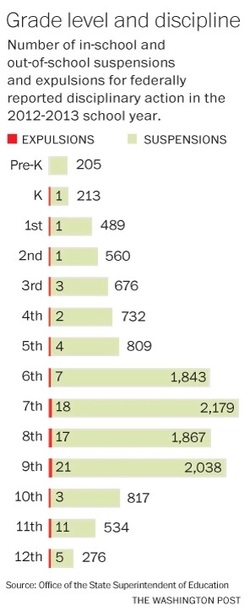 Credit: Washington Post
Credit: Washington Post School leaders and teachers must reflect on their instruction to determine if a student’s behavior is a matter of will (choice) or skill (knowledge). If a student is consistently punished for what seems like the exact same behavior, maybe that child hasn’t learned the skill you want them to display. While some students can follow certain rules effortlessly, others may need more instruction in how to accomplish behavior goals. Teachers, you can model behavior for students, showing them how you want them to act, and then give them a chance to practice with your feedback. Be sure they understand what your expectations are and how to accomplish them. It’s easy to assume kids should “know better,” but how can they know what you expect if they aren’t taught? Behavior, like any skill, must be practiced if a student is going to master it.
Behavior has functions that serve different purposes and adult behavior can unintentionally reinforce negative student behavior. It’s not uncommon for me to hear a teacher call a student out by name to tell them they’re doing something wrong. With this approach, students are learning that the way to get the teacher’s attention is to do the wrong thing. Likewise, a punitive consequence like suspension have can have a similar unintended effect. Consider this: A school continuously suspends a child with disruptive behavior who is craving parent attention. If the parent has to take off work every time a child is suspended, that child is getting one-on-one time at home with a parent they love. Why change?
When teaching expectations, it’s important to reinforce students’ positive behavioral choices. Teachers should call students out by name for doing what is expected or exceeding expectations. And they should keep students at school rather than at home. Kicking kids out of school for a few days, especially young children, doesn’t help them learn what they should be doing differently. Instruction does. Students must be taught positive behavior while they’re in the school environment. And like academic knowledge, that teaching needs to be clearly understood, practiced, and positively reinforced. Suspensions set children up for failure early; teaching behavior sets them up for success.
Connie Ward is an elementary school counselor in Maryland. Reach her via email or Twitter.

 RSS Feed
RSS Feed